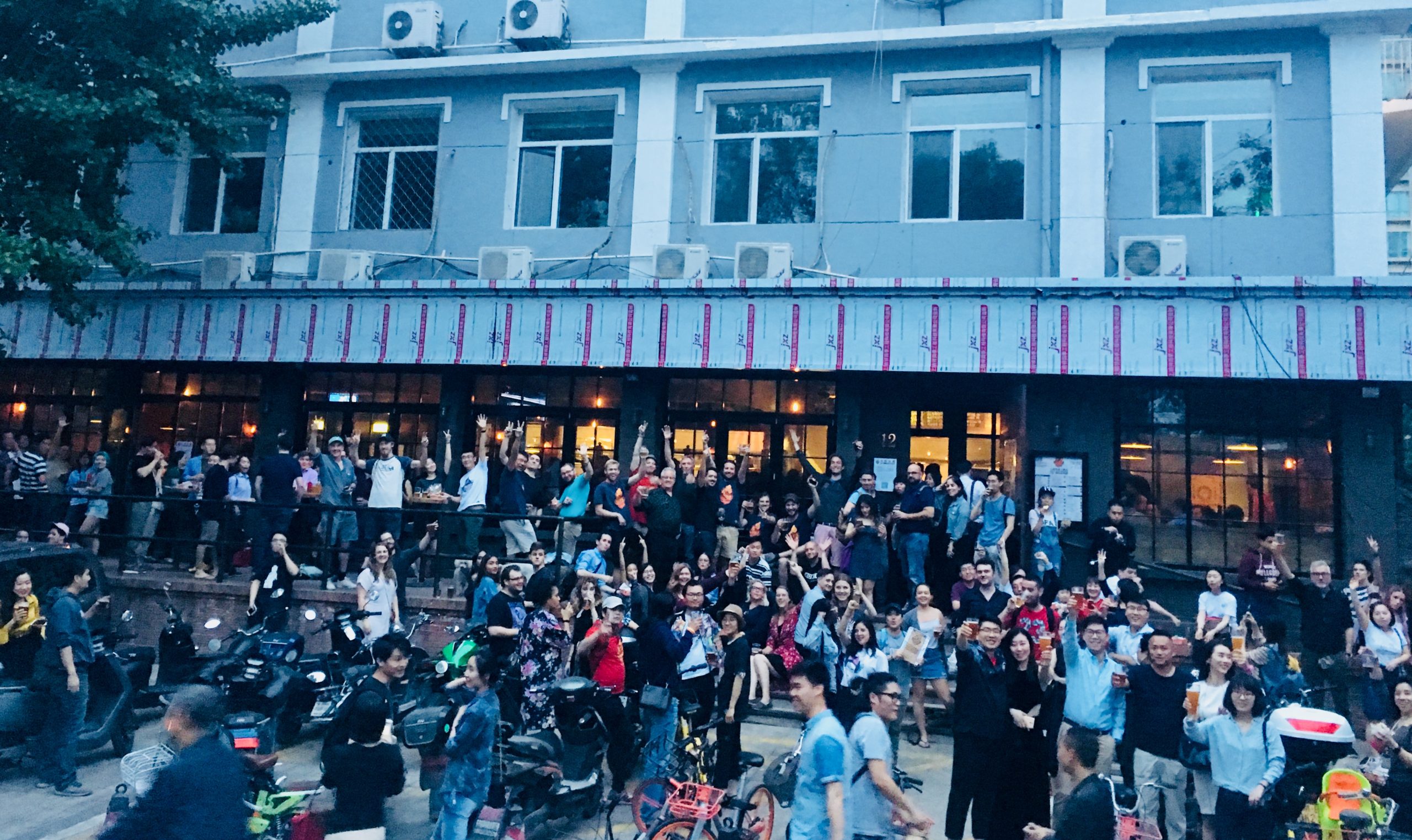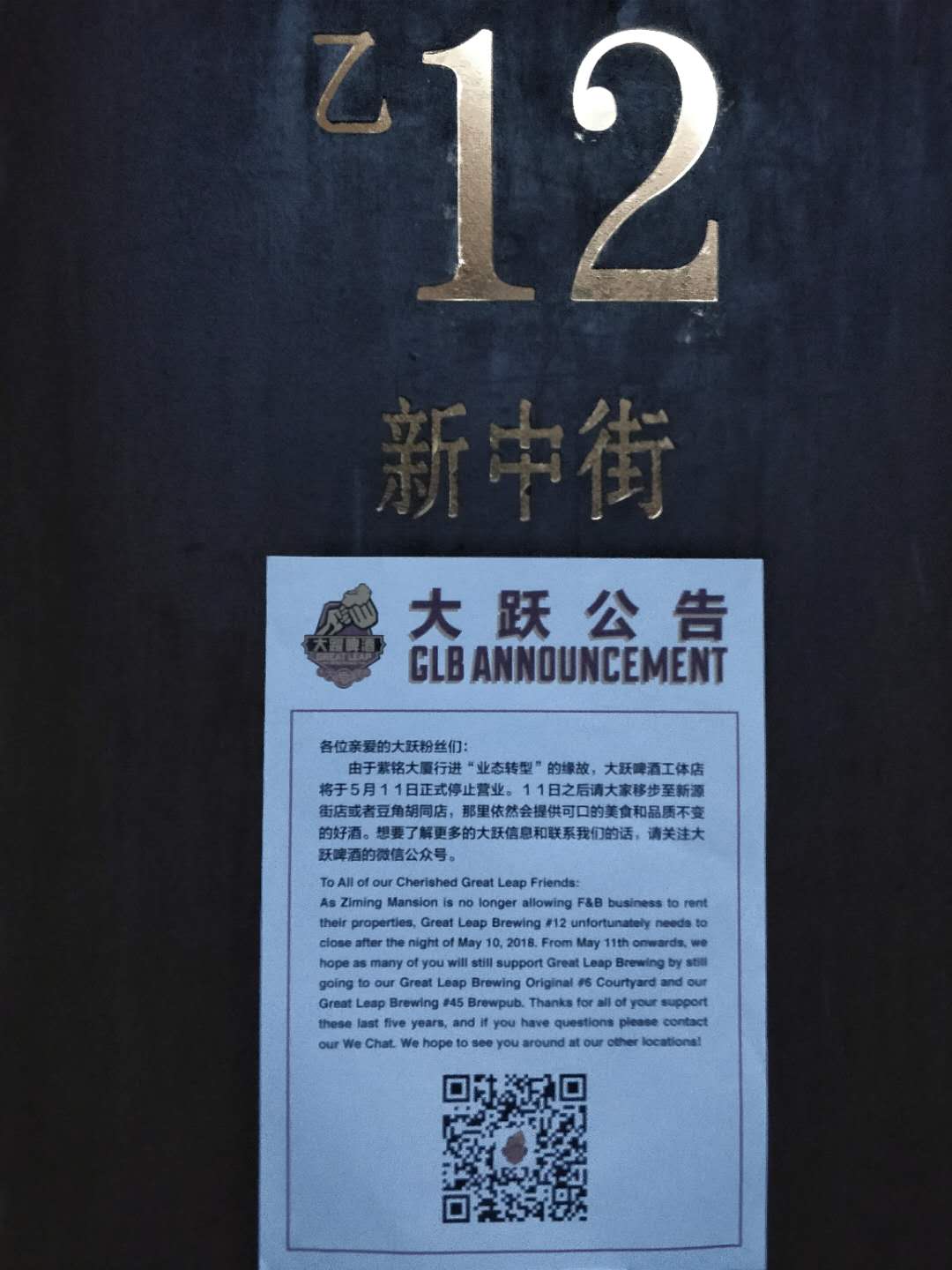Au revoir, Great Leap No. 12: Another popular Beijing bar forced to close

If you’re a beer drinker in Beijing, I know where you’re at right now. That’s because tonight is the final night for Great Leap No. 12, the flagship location of the first craft beer brewery in Beijing, which opened five years ago (three years after its original hutong location began operations). It is closing because the landlord no longer wants to renew the contract (though the space will be retained by Great Leap for use as an office and storage facility), in a trend that has become far too common within the city’s Second Ring Road.
“The past couple years has seen Beijing change its attitude towards the food and beverage industry, and that has now reached Great Leap Brewing as well,” owner Carl Setzer wrote on Tuesday in what amounts to a goodbye letter. He’s not taking the closure personally — two other food and beverage businesses in the area, both owned by Chinese nationals, have also recently been shuttered, according to Setzer — but for the rest of us it is disheartening all the same, as select “unwanted business types” in Beijing continue to be driven outside the city center.
“It’s been a long ten months and coming to terms with this reality was a hard ask for me and my team,” Setzer said. “Lots of emotions these last few weeks.” (Discloser: Setzer has written for The China Project in the past, a personal story about being questioned at a Taiwan airport after security officials confused hops for marijuana.)
The above photo was taken by Anna Zhu, who says, “It looks like five years of so much love condensed into one night.” Lots of cafes, diners, restaurants, watering holes, etc., have come and gone in the past two years — all those places in Fangjia Hutong, for instance — but this one feels a little personal. I don’t say this with disrespect intended to Slow Boat, Jing A, Arrow, or any of the other craft beer businesses in the city, but Great Leap was the first, it’s the biggest, it remains the highest profiled, and by far the most ambitious. The No. 12 location, in particular, felt like an accomplishment when it opened in May 2013 because Beijing had seen nothing like it. I don’t just mean this literally, though that interior design — post-industrial minimalism, the hardwood tables and high counters — now widely imitated, was unique and fresh at that time; I mean that Great Leap No. 12 became a spot to see and be seen in, because it felt like ours, as we had, like Setzer, lived through a period when our better beer options were Heineken, Guinness, or Hoegaarden, and the choice bars were either purposefully fancy or painfully dingy, serving Japanese whisky or buck-fifty tequila (almost certainly fake). Great Leap No. 12 was the place we had been waiting for. For its centrality and size and the fact that it provided a range of good beers at prices suited for middle-class adults, it became a go-to hangout. Importantly, it attracted a large and devoted local Chinese customer base in addition to foreigners. It was profitable and successful by every metric.
The “Cleveland man” who opened a small craft brewery in Beijing in 2010 that could produce 250 hectoliters of beer per year, with his equally ambitious and capable Chinese wife Liu Fang, recently broke ground on a production facility in Tianjin that can produce 500,000 hectoliters at capacity; if this brand can’t keep its flagship location, what hope does anyone have?
“This is the biggest outpouring of love I’ve ever seen in F and B,” said Setzer, who is out of the country at moment. Maybe he’s right, maybe not, I don’t know. But tonight I’m reminded that nothing is sacred in Beijing, that social spaces designed for people — bars and pubs being mere examples, as we could just as easily be talking about bathhouses, parks, or hutongs — don’t quite perform the same function in the People’s Republic. Perhaps we have taken them for granted, these establishments whose function is to help us, as individuals, recoup a bit of our personal identity lost amid the anonymous daily locomotions we carry on alone, in silence, within an amorphous and occasionally alienating collective. Social spaces provide simple pleasures, comforting noises, the distraction of expression, the meaningless yet graceful work of attempting to make a stranger laugh. For some reason, Beijing municipal authorities consider places which would facilitate these types of human interactions — these statements of humanness — as a form of “pollution.” I don’t know. Maybe. Waste water, noise, the chunder of the flushed, I suppose none of it is “clean” in the way that ideals are, or slogans, or nativist fantasies of returning X to X’ers. Whatever. Personally, I think they could just use a beer. If only there were a place to grab a good one.
Great Leap’s two other locations — the original hutong location, “No. 6,” and “No. 45” — will operate as normal.
Also see:







